Section 9: LITVAK FORUM
|
|
|
|
|
|
|
|
|
|
|
|
|
|
|
|
|
|
|
|
|
|
|

THE VOICE OF INTERNATIONAL LITHUANIA
|
VilNews has its own Google archive! Type a word in the above search box to find any article.
You can also follow us on Facebook. We have two different pages. Click to open and join.
|
Tue, 28th February, 2012 - Posted by - (1) Comment
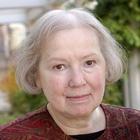
By: Myra Sklarew
When I stood in Rotuses Square in Kaunas last September, I listened to a young man speak about the burden he had carried in his young life to know that his own grandfather had been one of the killers during the War, a member of the Lithuanian Activist Front and part of a mobile killing unit. The young man asked forgiveness.
And when I stood with a group of some fifty people next to the place of massacre of over 2000 Jewish people in Kedainiai—a place where twenty-nine of my own family members were murdered, I saw how Lithuanians were making the enormous passage across time and cultural divide to embrace a wrong that they had nothing to do with. I ask myself if I have done enough in my own country to right the wrongs committed by my forebears.
Sun, 12th February, 2012 - Posted by - (2) Comment
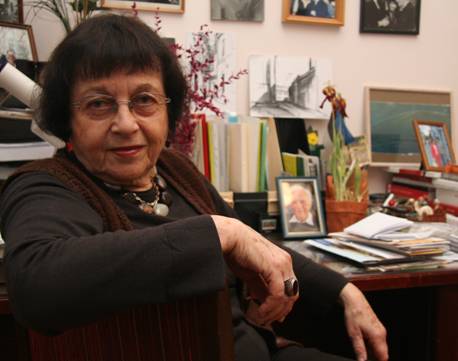
Professor Irena Veisaite
An Interview of Irena Veisaite, by Ellen Cassedy
Irena, you are a Holocaust survivor and have long been involved in Holocaust education initiatives in Lithuania. What do people outside Lithuania need to know about intolerance inside Lithuania today?
Of course there are examples of intolerance in Lithuania. All over the world there is intolerance. But there are also many attempts to promote tolerance in Lithuania. You should not always see only the negative side. We must appreciate positive steps as well.
What about the neo-Nazi march in Vilnius on March 11, independence day, and the swastika flags and anti-Semitic banner that appeared on Hitler’s birthday?
It is upsetting that this happened and that some young people joined that march. But it is also worth noting that both government and society at large reacted in protest against these incidents...
Sun, 12th February, 2012 - Posted by - (4) Comment
Postcards collected by Stephanie Comfort, Texas, USA
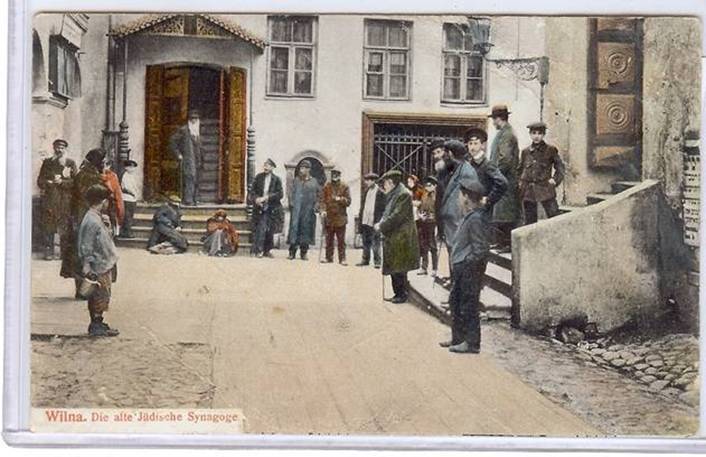
Old Vilnius Synagogue.
Stephanie Comfort, from Dallas, Texas, has over many years been an eager collector of old Jewsih postcards. Here is how she describes her ‘hobby’:
“I have the collecting gene: I collect dead Jews, their synagogues, their marketplaces and their family life - of the over 6,000,000 that were killed by the Germans and their countrymen "neighbours" there are few left to say Kaddish for them or to remember them. My Rabbi - Kenneth Roseman of Dallas once said that I am "Redeeming the Captives" by collecting the postcards and photos of them. I also collect and honour those few that saved them.”
Fri, 10th February, 2012 - Posted by - (2) Comment
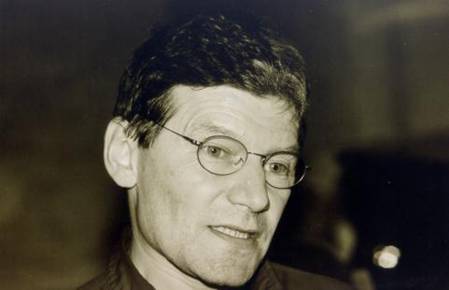
Markas Zingeris
Photo: Džojos Barysaitės
“Neo-Nazis are selling themselves as patriots to the mass-audience; they misuse the term patriotism, plant ersatz values and spread seeds of hate.”
Markas Zingeris interviewed by Diana Koval
Markas Zingeris - a well-known writer, poet, journalist and director of the Vilna Gaon Jewish State museum, in an interview by Vilnews, shared his thoughts on intolerance and anti-Semitism issues in today’s Lithuania.
Q. Anti-Semitic displays in modern-day Lithuania happen quite often. For example, last month someone hoisted up swastika flags on Tauro hill in Vilnius and hung a poster with anti-Semitic slogans near the Kaunas Jewish synagogue. Why do you think such events are happening now? Another question - whether the public or the government is too indifferent to such a phenomenon? The investigation of Petras Stankeras case was terminated due to lack of evidence. Doesn’t it show public aloofness?
M. Z. It shows the lack of determination among the lawyers, or lack of consensus on some really central issues. Personally, I think it is the serious gap in humanitarian education among members of the judiciary, politicians, journalists and the lack of in-depth understanding of history of the twentieth century. In general, it is the absence of common accepted views about the past in a society stuck in the crossroads between East and West, Past and the Future.
Fri, 16th December, 2011 - Posted by - (10) Comment
OPENED TODAY, FRIDAY 16 DECEMBER 2011

“Failure is impossible,” is the title of the book that was held by Lithuania’s Minister of Culture, Arūnas Gelūnas (left), at the opening of the Vilnius Jewish Public Library Friday 16 December. Wyman Brent, the Californian book collector behind the amazing collection of more than 5.000 books, plus videos and CDs, says today is one of the happiest days in his life.
Photos: Aage Myhre.
Friday 16 December 2011 the new Vilnius Jewish Public Library, located at Gedimino Avenue 24, 2nd floor, in Vilnius was officially opened. Guests from USA, Israel, European Parliament, Seimas (Lithuania’s parliament) of the Republic of Lithuania, Government of the Republic of Lithuania, Lithuanian Ministry of Culture, Lithuanian Ministry of Foreign Affairs and others were participating.
On Saturday 17 December 2011, from 11:00 to 17:00 the library will be open to the general public, giving everyone an opportunity to view the premises, the collection of books and photographs, the exhibits, and a presentation of a slide-show giving a retrospective of the establishment of the library. Visitors will be greeted and will have the opportunity to speak with the initiators of the library.

Panel at the press conference (l/r): Davia Kiminaite, Wyman Brent,
Miša Jakobas, Petras Zurlys, Arūnas Gelūnas and Petras Austrevičius.
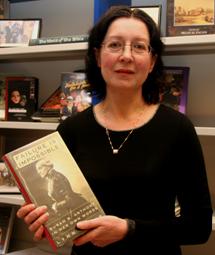 Daiva Kiminaite is now Head of the Vilnius Jewish Public Library |
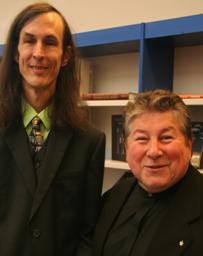 The composer Anatolijus Šenderovas with Wyman Brent. |
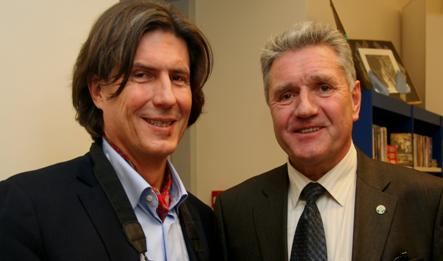
Žilvinas Beliauskas (left) and Petras Zurlys have both done a great job
for the realization of the library.
Read also:
The California Baptist who collected 5000 Jewish books and brought them all to Lithuania
Fri, 16th December, 2011 - Posted by - (0) Comment
"The Eternal Question” / “DI ALTE KASHE”
FRAIDY KATZ sings Yiddish
Produced by Wolf Krakowski and Jim Armenti
The Eternal Question
Top Ten Records of the Year
One World Radio
WHUS, UConnecticut@Storrs
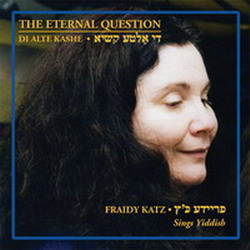
Rated 4.5 stars, George Robinson, Jewish Week, Read Review
Fri, 16th December, 2011 - Posted by - (1) Comment
O P I N I O N / R E V I E W by Birutė Ušinskaitė
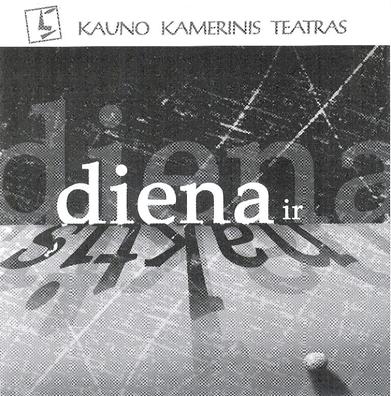
Cover of playbill
It was just another rainy, temperate evening in early December of the year 2011, but the play I was privileged to see at the Kaunas Chamber Theater, Day and Night, proved to me, a proud woman of Vilnius, that not all that is bold and brilliant here comes from our capital.
Wed, 14th December, 2011 - Posted by - (12) Comment
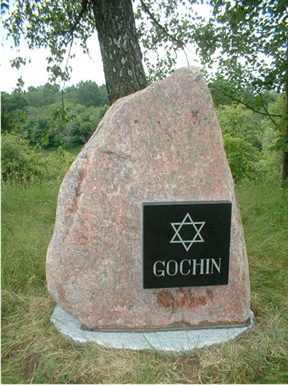
In Janjelgava in Latvia, I found the grave of my Great-Grandfather, it was shattered into thousands of pieces, today it appears in its original state after a complete re-build and restoration to what it would have been when my Grandmother and her siblings would have had it constructed.
Author: Grant Arthur Gochin, Los Angeles, California, USA.
I document my family to the 1700’s in Papile, Akmene District in Lithuania. Jews have lived in Lithuania around 700 years, it is possible that my family has been Lithuanian since the 1300’s. A prerequisite for any Jewish settlement is that a cemetery be built to bury the dead, and so, after 700 years, Lithuania holds many hundreds of Jewish cemeteries, and in all likelihood, there are thousands that had the name Gochin that were buried in the vicinity of Papile.
A religious requirement and a community requirement of Jews is that they maintain and honor the cemeteries of their ancestors, and so, throughout the world where Jews live, one can see clean and neat cemeteries where descendants honor their ancestors. This is very similar to the Lithuanian tradition of All Souls Day where families visit and honor, and remember the graves of their ancestors.
Wed, 14th December, 2011 - Posted by - (2) Comment
http://www.litvak-cemetery.info/
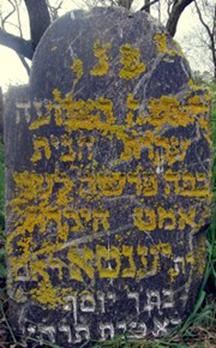
MACEVA (מצבה Matseyva in Hebrew) - In Hebrew language means 'gravestone'. 'MACEVA' is a non-profit organization, which aims to preserve signs of old Jewish cemeteries, for the future generations in Lithuania and the diaspora.
Wed, 9th November, 2011 - Posted by - (5) Comment
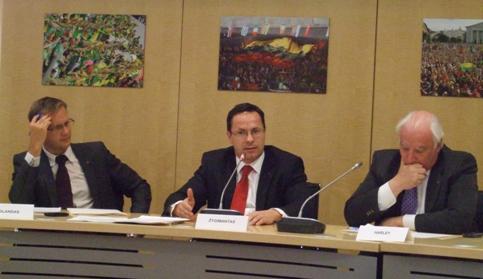
Minister Plenipotentiary Rolandas Kacinskas, Ambassador Zygimantas Pavilionis and Harley Felstein, Project Chairperson.
On the evening of Thursday November 3rd, 2011, the Jewish Lithuanian Heritage Project hosted a roundtable “Think Tank” at the Lithuanian Embassy in Washington D.C. The concept of the think tank originated from a white paper prepared by Harley Felstein, Project Chairperson, and Adrienne Oleck, a Board member.
The meeting drew together concerned intellectuals from the Washington D.C. area and from the Lithuanian Embassy, the Honorable Ambassador Zygimantas Pavilionis and Minister Plenipotentiary Rolandas Kacinskas. The theme of the discussion was, "A comprehensive Five Year plan to improve Lithuanian-Jewish relations: Cultivating Sunflowers."
The Sunflower project will create three core programs focusing on:
1) Communication and Dialogue;
2) Youth engagement and education; and
3) Jewish heritage projects including cemetery restoration.
Tue, 8th November, 2011 - Posted by - (3) Comment
Some time ago a reader in the USA wrote the following one-sentence ‘letter’ to the editor of VilNews:
"May Lithuania rot in hell for a 1000 years."

This ‘letter’ resulted in several posts and comments from our readers around the world. We in the editorial team have been very impressed by how informative and balanced most of the posts have been. Probably it is this kind of open, intelligent debate that is needed to build bridges across the gap that emerged in the relationship between Jews and Lithuanians during and after World War II. We thank all who participate, not least the following four: Olga Zabludoff, Donatas Januta, Didier Bertin and Yves Plasseraud:
Mon, 31st October, 2011 - Posted by - (4) Comment
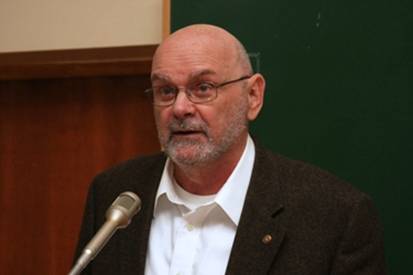
Dr. Saulius Suziedelis.
Scholar of Lithuania’s Holocaust history.
Photo: www.komisija.lt/lt/naujiena.php?id=1301995164
By Ellen Cassedy
“The only way for Lithuanians to lighten the difficult history of 1941 is to embrace it.”
The writer of these words, Dr. Saulius Suziedelis of Millersville, Pennsylvania, USA, will be honored in Vilnius on November 18, 2011, by the Lithuanian Ministry of Education and Science.
Also receiving awards will be Dr. Vytautas Cernius, a longtime professor of education at Temple University in Philadelphia, Pennsylvania, and Dr. Arvydas Kliore, a space scientist with NASA. The prizes for intellectual achievement are awarded annually to Lithuanians living abroad.
Mon, 31st October, 2011 - Posted by - (1) Comment
Other responses to the 26 October comment from Mr. Januta
![]()
FROM: Alexander (26 October)
Well said. I just wish those who write about Lithuanian-Jewish relations and blame all Lithuanians for the killing of Jews, would get their true facts before writing.
![]()
FROM: fdfdg (26 October)·
An outrageous pack of lies.
The Jews in Lithuania were murdered by ethnic Lithuanian volunteers. Lithuanians are still trying to hide this fact after 60 years, from themselves, their children and now they are attempting to impose this false history on the world at large. Dov Levin isn't positing double genocide, there is no equals sign there. "Double genocide" is not the name the Lithuanians give to their own policy of Holocaust obfuscation, but it's an accurate name. The number of Lithuanian perpetrators is in the tens of thousands, and those are just the active shooters. If you want to get into passive support for genocide, it's much higher. There was no specifically Lithuanian Waffen SS, because the Lithuanians created their own pro-Nazi formations before the Nazis got around to it, TDA, LAF etc etc. and these forces were involved in the Holocaust in Poland, Ukraine, Belarus and elsewhere, besides their native Lithuania. The author is obviously fooling himself into thinking it's possible some Lithuanians were fooled into it at German direction, but the LAF was a Lithuanian organization, not a German one, and their underground cells of ethnic Lithuanians inside Lithuania (LAF was pretending to be the government in exile in Berlin) got the orders from HQ: prepare to slaughter your Jewish neighbors as soon as Soviet-German hostilities break out. Didier Bertin's point concerning the supposed Soviet genocide of Lithuanians was not that some Lithuanians survived, it was that not only did the vast majority survive, their population actually increased during the supposed genocide. This is an outrageous pack of lies by another Lithuanian Holocaust obfuscator.
![]()
FROM: Richard Vitkauskas (26 October)·
Excellent article Donatas. Many thanks
Mr. Januta’s response
![]()
FROM: Donatas Januta (27 October)·
Dina Porat, a respected Israeli historian estimated that the total number of Lithuanians, involved directly and indirectly, in the German organized killing of Jews was up to 15,000, i.e., about 0.5% of the population
For those who may want a little perspective on fdfdg’s preceding comment. He states that my article is “an outrageus pack of lies”, and specifically he then says: “The number of Lithuanian perpetrators is in the tens of thousands, and those are just the active shooters.” Dina Porat, a respected Israeli historian estimated that the total number of Lithuanians, involved directly and indirectly, in the German organized killing of Jews was up to 15,000, i.e., about 0.5% of the population. And Arunas Bubnys, another historian, has estimated that those directly involved, i.e., what fdfdg refers to as “the active shooters”, was somewhere between 2,000 and 3,000. But according to Mr. or Ms. fdfdg, both of these historians are just liars. Judge for yourselves the rest of fdfdg’s remarks.…
Sun, 30th October, 2011 - Posted by - (1) Comment
http://vilniusjewishlibrary.org/
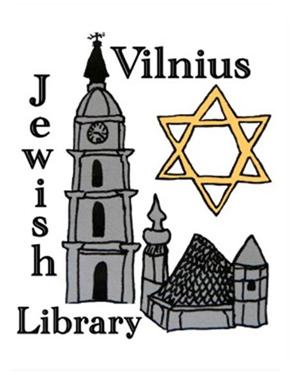
The Vilnius Jewish Library will be the first Jewish library in Lithuania since 1943, and we are happy to announce that the opening will take place 16 December. Location: Gedimino prospekto 24.
Wyman Brent is not like California Baptists in general. Several years ago he fell in love with Vilnius. His great passion in life is Jewish books - books written by or about Jews. Therefore, he has over the latest years bought more than 5.000 such books and taken them to Vilnius to open a Jewish library. Read below his own story about his ideals for a meaningful life.
Text: Wyman Brent
Using a wire brush to scrub a broken sink can help strengthen Jewish culture. Most people are not aware of this. Thus I found myself kneeling in a parking lot on a hot summer day with a hose and attempting to remove concrete dust from an old metal sink. To aid in the cleaning, the hose was turned on to wash away the dirt and dust. After a while, there was quite a stream of water running over the asphalt, down the street where it took a right at the intersection until it reached a storm drain. I only noticed this at the end when hot and tired, I was going to a café to get a cold drink.
What I did pay attention to while repeatedly running the brush and hose back and forth, up and down, left and right was the puddle created. The tiny pool of water gave off a big reflection of trains, trains going one direction or another, one city or another. Trains carrying passengers and trains carrying freight. That was now, but what about then. I had sat out many times over the past months on a balcony overlooking the parking lot from which one could sit and drink coffee or tea (your choice) and watch the trains roll by. It is an idyllic place to relax and read a good Jewish book…or maybe better to say a book by a Jew. I have a wide variety of reading material.
Sat, 29th October, 2011 - Posted by - (0) Comment
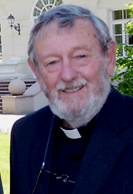
Dominican Father David O’Rourke, one of the two priest producers of “Red Terror on the Amber Coast.” Father O’Rourke is director of The Tatra Project (www.tatraproject.org), which provides educational resources and media on life under the former Soviet Union.
I lived and worked on and off in Vilnius, from 2000 until about 2009. Part of my work involved research in the film and photo archives that led to the documentary film, Red Terror on the Amber Coast. I was the writer and producer. I have only one point I want to make here, but I think it is important.
From the time that the Soviets first occupied the Baltics after the Molotov-Ribbentrop Pact until the fall of the Soviet system, essentially all the information about life in the Baltic Republics came from the occupying governments – Soviet and Nazi. Occupiers have their own agenda. Telling the truth about what they were doing in the countries they occupied was not one of them. To the contrary, both the Soviets and the Nazis were expert in producing self-promoting propaganda. So I believe it is both naïve and foolish to look to news and information reports produced by either of these regimes about the occupation years as though they were reliable. My own view is that relatively little concerning life during these years is known today outside these countries and their several diasporas. And very little is known because historians in the West don’t think that the Baltics and their people are important enough to their own studies to worry about.
David O'Rourke
California, USA.…
Tue, 11th October, 2011 - Posted by - (1) Comment
Washington, D.C. – The United States Holocaust Memorial Museum is looking for people to share their experiences of life in Lithuania during World War II and the Holocaust. Ina Navazelskis of the Museum’s Oral History Branch is particularly interested in speaking with non-Jewish Lithuanian witnesses to the Holocaust who now live in the U.S. or Canada.
“If you have a story to tell, or know somebody who does,” Navazelskis told VilNews, “I hope you’ll contact me. I want to hear your story and how it intersects with the Holocaust.”
VilNews e-magazine is published in Vilnius, Lithuania. Editor-in-Chief: Mr. Aage Myhre. Inquires to the editors: editor@VilNews.com.
Code of Ethics: See Section 2 – about VilNews. VilNews is not responsible for content on external links/web pages.
HOW TO ADVERTISE IN VILNEWS.
All content is copyrighted © 2011. UAB ‘VilNews’.